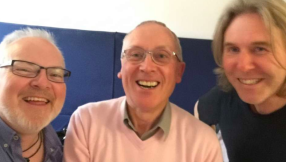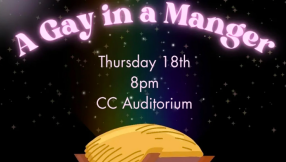Da T.R.U.T.H on God-orientated rap
In this interview after the Arizona Gospel Music Convention on September 7, 2008, Da' T.R.U.T.H,. a graduate of Jewish Studies at Philadelphia Biblical University and Stellar Award Winner, is sure to challenge you to become more studied in the Christian faith as 2 Timothy 2:15 tells us.
So what does Da' T.R.U.T.H. stand for?
Well, it means, I cheated, but it means To Reach "U" Through Him.
What was the inspiration behind the "Open Book"? You are very transparent on this album.
You know when I look at the YouTube; when I click thousands of people are watching us on television and typically when we minister on stage we are talking high lofty theological stuff, necessarily, I believe. Not that we are trying to impress anybody or get fancy with the Bible, it's because I think we start to seek to communicate stuff that's high in priority scripturally to this generation.
So I figured that in working on the third record and even on the albums ["Moment of Truth" and "The Faith"] there's high theological stuff, especially "The Faith". I did it intentionally. I intentionally talked over peoples heads, just a little bit because, I wanted the church to have to reach, I wanted the younger generations to have to reach to get it. Or say I don't get it now but then as they grow then they could appreciate it, that kind of thing. I wanted to make an album had that kind of effect.
So going into my third record, I went real practical. I wanted to just get real practical. You know because I think that's what you find in scripture when Paul is writing the epistles, it's doctrine, doctrine, doctrine, doctrine, doctrine...Chapter 1 of Romans...Chapter 2 of Romans....all the way up to Chapter 12. Then, he gets into duty, the practical stuff. Same thing with Ephesians 1, 2, 3 and 4 are all doctrinal, 5 and 6 [are] practical. That's how the epistles are written. So I figured, my first, my second [albums] start heavy theologically [and] doctrinally. My third [album] real practical.
So that was all a strategy?
It wasn't but that's how it unfolded. But even "Open Book" is a double entendre. So on one hand it's a record where I wanted to be as transparent as I could be within reason. Because I didn't want to let it all...[out] You don't want to disqualify yourself, you know what I mean? Like you don't want to disqualify yourself. I think you need to use wisdom even in transparency, you know what I mean? I mean especially when you talk to the masses....
With people that you're intimate with like one on one you can be as open as you need to be. But I think when you're talking to the masses there's still some limitation to how transparent you can be. So it wasn't just about me being transparent. You know David was transparent but the thing about the Psalms that I love is that the Psalmists would let you in on the activity of their hearts but they wouldn't leave you there. See a lot of people don't get that, especially with like Christian rap. A lot of people come from the streets and talk about they've done or from such and such and such...then they leave you there. Even like their prayers to the Lord but they leave you there with their emotions, with their cries, with their despair. You don't see that in the Psalms, primarily.
99.9% of the Psalms are David crying out unpacking his heart, then by the end, by the end of each Psalm he's capping it off with the commanding voice of God. Or like he's capping it off with the heart and the mind of God. So it's like "... but God", "... but God who's rich in mercy" That's the kind of talk. It's always "...but God who's merciful and true." "...but God who can, but God who is my rock my shield, my deliverer."
That's the kind of talk you get from the psalmist. They don't just leave you with that...{despair]. That's the balance of "Open Book" I want to let you in on the activity of my heart but I'm not going to leave you there. I'm going to also bring the heart and the mind of God to bear on whatever I'm going through internally or in my life. God - oriented solution.
The other aspect of "Open Book" was inspired by 2 Corinthians 3:2 where Paul says "You are living letters being read... You are the letters of Christ being read by all men." ...We're the only Bible that some people read. We are living letters... So that was the other side.
In, "Man Up" you talk about men taking courage, practising what they preach, being holy, etc and you do put scriptures in your CD. What scriptures do you use to support your songs?
1 Kings 2:2-4 where David talks to Solomon. Where David is on his death bed and he says be strong be a man. He's on his death bed giving him [Solomon] a speech about what it means to become a king. Now the deep thing is....he doesn't talk to him about being a king but he talks to him about being a man. He's not talking about kingliness. He's talking about manliness. Be strong, be a man by doing all that's been instructed you in the law of Moses.
The foundation for manhood, first of all, biblical manhood, that is - is doing all that has instructed us in the Word of God. And to be strong being a man is strength in the scriptures... 1 John talks about being strong. He writes to young men and he tells them to be strong, but the idea in strength in the scriptures is "enduring temptation". That's the idea. It's being able to stand up against temptation. That's Biblical manhood, when you can resist temptation and you can bear up under the pressure of it.
Biblical manhood is having a wife. Biblical manhood is not walking around the house with all this bravado and saying "I wear the pants". But rather cleansing her, nurturing her in the Word, with the water of the Word. Being a leader but not lording over her. Remember Paul said to the Pastors don't Lord over them as the gentiles do.
But a large piece of "Man Up" was inspired by two books: one book was called "The Godly Man's Picture" by a Puritan named Thomas Watson...another book by David Murrow called "Why Men Hate Going to Church". And it just talks about how the only reason the men hate church is because there's a lot of femininity in the church, [for example] the way they pray, holding their hands up [like this]. God didn't make us like that. That's called effeminate. God designed men to be a certain way and he designed women to be a certain way... Even the way some preachers talk to the congregation [saying] "Come on look at three people and say baby..." or "Look at three people and say honey..." See, I got to look at another man and say "Honey?!"
So to the churched it's not noticed but to the nonbelievers, they pick it up right away. See we've been conditioned. But see nonbelievers they don't know nothing about that. They got to look at their buddy they just smoked weed with and say honey?! ...So the bottom line is I'm trying to call men back to Godly biblical manhood, which includes maleness.
I love "13/30" and "Everyday". It seems that "Open Book" is about purpose and calling all throughout. How did you come to know your calling?
I stumbled on my calling. I believe God wires us in a certain way and I think he intends for us to follow that - follow our natural bent. And the challenge sometimes is when you have several things that are passions and you have to pick and choose from those passions.
So for a long time my passion was music, music, music. I went to Temple University to study music for three years. I was in the all city jazz band, studying music, reading music, drum lesson private lessons... I mean you name it reading, theory classes, because I thought that was going to be my life. As a matter of fact when I was 16, I prayed to the Lord that I wanted to travel the world and I thought it was going to be drums. Yeah, I play drums. I play drums at my church.
So my point is that, later on, when I was 16 I detected this passion for speaking but it wasn't like public speaking. I was just debating everything. I mean like Muslims, Hebrew Israelites, Jehovah Witnesses and all of a sudden I started building my faith. I started buying all these apologetic books to help me defend the faith. So I started failing my classes because all I wanted to do was debate Muslims all day. So my first semester at Community College I got straight A's then second semester at Community College I got straight F's. It was just the most terrible testimony, but it was because I was debating Muslims.
But what I realised, the good in it was that, I was built for something else. That's why I went to Bible college. So for me I knew I was a communicator. Because every conversation I had, people came in for counselling. I started studying my Bible nine hours a day before I even thought about Bible college. I had no desire for anything else. I literally by God's grace followed a passion that burned and led me here.
I started rapping and then I started getting poured into by Ambassador and that only further cultivated what was in me. I started watching Cross Movement, like, walking with them closely within the ministry. Then I started rapping more and then all the pieces just providentially got arranged and everything came together.
Leaders started seeing the leader in me. So I'm 16 and Vice President of the youth department. They started calling me and asking me can I teach so I started thinking that I was getting husky in the faith. Then I grew up in a Christian home on top of that. So I was rapping and I was teaching. All I know was God called me out to commit my life to His works. I had no clue what that was supposed to look like. No clue. I am just going. Just doing. I went to Bible School, getting equipped, so by the time I got out of Bible college in 2004 was the same year(God's providence) "Moment of Truth" came out.
The first three months out of Bible college it was like crickets. My wife was like 7-Eleven is hiring. I was like "No baby trust me, God....", I gave her the speech. I said just give it time. Three months later it was crazy and my phone was ringing off the hook. I haven't stopped moving since 2004. I did 4 tours with Cross Movement and 1 tour with Kirk Franklin. Then I did my own personal travelling.
In this conference it's been stressed that one has to have knowledge of the Gospel Music Industry, while still having ministry in your heart. Where's the line drawn between ministry and entertainment? Is there a line? What are your thoughts on that?
I would like to think that I do both. I try hard to have that balance. I think it all has to do with intentionality. I get rebuked for this sometimes but I've gotten to the point where I don't mind referring to myself as a performer. As the very nature of what we do is performance because if you're not performing then you're just a preacher. So the fact that you went to the studio, went to a booth, put on head phones, had music playing in your ear and you rhymed on top of it automatically puts you in the category of performer/entertainer, if you ask me.
Now, everybody entertains to a different degree. So for myself I'm into it all, for instance, if you watch my Live DVD. As I think it's not just what's being said but how it's being said. I think that you can compartmentalise in a way that God never intended you to. In other words, sectioning off or making spirituality separate from performance. God never required that of us or demanded that we separate those two. So I personally feel like the one aspect of what we do has attractional value while the other aspect of what we do has missional value or ecclesial value or evangelistic value.
So the attractional value I aliken unto miracles as Jesus was performing miracles. He was just drawing attention of the people to Himself. Like the two fish and five loaves 5,000 ate from it and then difficult sayings.
So the attractional element is that God gave us media. He gave us all the dance, the moving, not so we can separate from spirituality. That doesn't make sense. Like He gave us [the Word] that says yield your bodies as instruments of righteousness, in the same way as we yielded them as instruments of unrighteousness.
I think the idea is taking all you are -every member and yielding it or utilising it for something that has a righteous orientation as opposed to something that has unrighteous orientation. So I think using all of what God gave you. I think that He made you that way so why not use all of what He made. That's the whole point of why He wired you. He didn't wire you to be business minded so that you could say that's not spiritual so let me do something else.
But I could get on the stage and do this [stand and not move]...but not when God wired me to get on the stage and get all crazy up there. So I believe it's both-and. I believe one aspect of it is attractional and the other aspect of it is what we're using to fulfill the great commission.
I noticed that when I listen to some Gospel music or secular DJ, sometimes they might put secular beats on top of Christian lyrics. What is your take on that?
I think it's counter productive, long and short of it. If you play the Lil' Wayne's "A Milli" beat on top of Christian Lyrics[for instance], people like it because it's the "A Milli" beat. And this is what I found, this is the perfect test of how we know it has less to do with the beat... Well, put it this way, if the "A Milli" were one of our [da' t.r.u.t.h.'s] beats it wouldn't get the same craze. So it's like young Christians or young people who are not Christians at all, just church kids, hear the "A Milli" beat and they go Ahhhhh....[start screaming and getting all excited]. And this is still fresh [in my mind] because it just happened the other day. Now if we would[da' t.r.u.t.h.] have had the same beat like that too, it wouldn't have had the same impact, because they are more in love with Lil' Wayne. Like that's their god. That's an idol for them.
So it's their affection for that idol that surfaces when those beats play. So Soulja Boy "Superman"[for example]...so when they hear that beat it's Soulja Boy, their idol, that surfaces when the beat comes on...
I believe that it's counterproductive. It works against your goal, which is to detox the generation. Our goal is to detox the generation, to help tear down idols... So when you play those beats on top of Christian lyrics you're only raising their affection for those idols.
How many songs do you write in a month, day or quarter? How do you choose the songs you write for your album?
How do I choose them? I am a very conceptual writer. A lot of times I write in response to stuff. I think when I'm writing I always have a goal in mind so I'm never just writing and then just pick a song out of all the songs I write. I'm like always writing the song that's gonna make it. I'd like to be able to do that [write a lot of songs] but I don't think my brain works that way. I am constantly writing but it's always the songs that are gonna make. It's not like I write 15 songs and I pick 5. The five I write are the five that go on the album. I'm a slow writer. Like Flame writes 50,000 songs he can do that. I can't do it, my brain is too critical - analytical. Everything is bitesize and I'm building a case.
Where do you see yourself in five years?
I don't know, because I didn't plan any of this. It's hard to say. I am talking about starting a label now. Not because that's the thing to do or because I want money even. I'm not even really worried about that. But I think there's so much music in me, since I am a musician. I would love to be the person scouting out and developing artists, and pushing them out there. Solid ridiculously talented ministers. Another thing, I will have a masters in theology in five years. I am heavily involved in my local church and I will be appointed Elder in December so wherever that takes me. And possibly I don't know where I'll be in music but if I'm not in music I'll probably be teaching theology.













